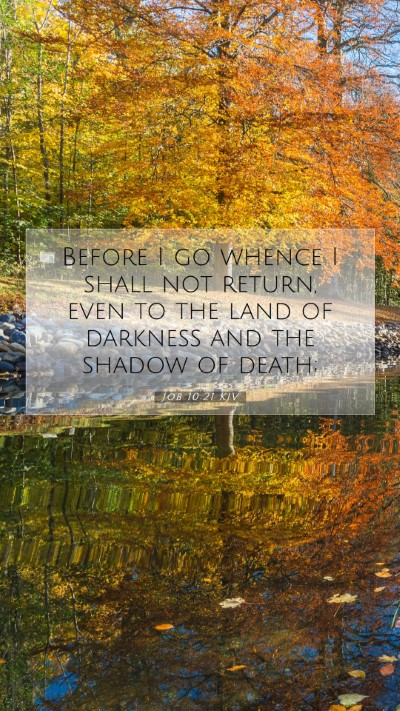Old Testament
Genesis Exodus Leviticus Numbers Deuteronomy Joshua Judges Ruth 1 Samuel 2 Samuel 1 Kings 2 Kings 1 Chronicles 2 Chronicles Ezra Nehemiah Esther Job Psalms Proverbs Ecclesiastes Song of Solomon Isaiah Jeremiah Lamentations Ezekiel Daniel Hosea Joel Amos Obadiah Jonah Micah Nahum Habakkuk Zephaniah Haggai Zechariah MalachiJob 10:21 Meaning
What is the meaning of Job 10:21?
Before I go whence I shall not return, even to the land of darkness and the shadow of death;
Job 10:21 Bible Verse Meaning
Understanding Job 10:21 - Bible Verse Commentary
The verse Job 10:21 states: "Before I go whence I shall not return, even to the land of darkness and the shadow of death." This verse, steeped in profound emotion, reflects Job’s deep questioning of his plight and his desire for understanding amidst suffering. Below is a synthesis of insights derived from notable public domain commentaries, providing a comprehensive understanding of this verse.
Overview of the Context
Job, amidst his suffering, engages in a profound dialogue with God. His despair is palpable, expressing confusion over his circumstances and a desire for clarity and justice in the face of profound loss. This chapter captures Job's lamentation and deep yearning for God's intervention.
Insights from Matthew Henry
According to Matthew Henry, Job's statement reveals both his plight and his longing for answers from God. Henry emphasizes that:
- Job is aware of his mortality, understanding that he is on the brink of death.
- The "land of darkness" symbolizes a state of oblivion or despair, highlighting Job's feeling of isolation.
- This verse also reflects Job's fear of eternal separation from God's favor, showcasing the urgency in his cry for help.
Insights from Albert Barnes
Albert Barnes provides a critical examination of the implications behind Job's words:
- Barnes points out that Job is not just lamenting his physical suffering but is also grappling with existential questions.
- He highlights that the "land of darkness" is not merely a reference to death but also to a spiritual state devoid of divine presence.
- Barnes notes the heightened emotional state, suggesting that Job’s agony is intensified by his feeling of abandonment.
Insights from Adam Clarke
Adam Clarke delves into the theological implications of Job's lamentation:
- Clarke emphasizes the importance of Job's recognition of his mortality and the transient nature of life, which is pivotal in understanding the human condition.
- He describes the "shadow of death" as a metaphor for the heaviness of despair and the psychological turmoil Job experiences.
- Clarke encourages a reflection on the inevitable nature of death, prompting readers to consider their own life’s purpose and relationship with God.
Theological Significance
The theological themes present in Job 10:21 offer rich material for Bible study discussions, emphasizing human suffering, the quest for divine understanding, and the nature of life and death.
- Human Suffering: Job’s cry for understanding amid suffering resonates with many believers who seek answers in their tribulations.
- Existential Reflection: This verse compels readers to confront their mortality and consider the significance of their spiritual journey.
- Divine Justice: Job's appeal to God highlights a central theme in scripture concerning the search for justice and understanding in the face of suffering.
Application of the Verse
For those seeking practical applications, Job 10:21 serves as a reminder to:
- Engage in honest dialogue with God regarding struggles and questions of faith.
- Reflect on the transient nature of life and the importance of relationships—both with God and others.
- Seek hope and understanding even in the face of despair.
Related Bible Verses
This verse is interconnected with several other scripture passages that explore similar themes of suffering, death, and the human experience:
- Psalm 23:4: "Yea, though I walk through the valley of the shadow of death, I will fear no evil; for thou art with me."
- Ecclesiastes 3:20: "All go to one place; all are from the dust, and to dust all return."
- 2 Corinthians 5:1: "For we know that if the earthly house of this tabernacle were dissolved, we have a building of God, a house not made with hands, eternal in the heavens."
Conclusion
Job 10:21 invites introspection and encourages a deeper exploration of faith during challenging times. Understanding this verse through the insights of esteemed commentaries provides valuable perspectives for those engaged in Bible study, enhancing both personal and communal understanding of scripture.
In summary, this verse encapsulates profound themes of anguish and yearning for understanding that resonate through the biblical narrative, guiding believers on their spiritual journeys.


